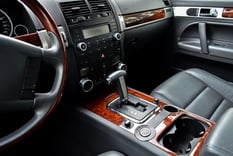 One of the primary end-uses for our ABS sheet is in decorative paint and film lamination applications for the automotive industry. But this is not just any ABS sheet - in order to supply material that ultimately becomes a piece of a vehicle, the material requires a perfect surface, or as close to it as possible. To describe this surface the industry coined the term "Class 'A' Surface." This terminology is used to indicate the requirement for a near-perfect surface quality virtually free from defects for applications where aesthetics and visual appeal are the main focus.
One of the primary end-uses for our ABS sheet is in decorative paint and film lamination applications for the automotive industry. But this is not just any ABS sheet - in order to supply material that ultimately becomes a piece of a vehicle, the material requires a perfect surface, or as close to it as possible. To describe this surface the industry coined the term "Class 'A' Surface." This terminology is used to indicate the requirement for a near-perfect surface quality virtually free from defects for applications where aesthetics and visual appeal are the main focus.
In the automotive industry, any decorative surface in the interior cabin and the entire exterior, with the exception of the under body, requires a class “A” surface. Impact Plastics has been successfully supplying ABS sheet and rollstock as the substrate for wood grain film lamination applications used as interior panels in many luxury automobiles seen on the road today. In addition, our ABS sheet is used as the substrate for ornamental decorative brand logos on the automobile’s exterior. But accomplishing this is no small feat – it took dedication, investment, and a boost to our quality control procedures to achieve a surface quality suitable for the luxury automotive applications this material is ultimately used in.
With such critical quality specifications to meet, not just any ABS can be used in the production of this sheet - an important piece of the puzzle for the development of this highly aesthetic product is stringent resin qualification with an extrusion spec that allows for no gels or any other imperfections apparent to the naked eye. However, choosing the correct resin is only a fraction of the battle - running interference on other opportunities for contamination presents a challenge. Dust and grime is no stranger to the typical manufacturing environment, and this dust can eventually make its way into the air and onto the surface of the sheet as embedded particulate.
 Because of our experience supplying to other sensitive market applications, such as medical device applications, that require the same clean environment and attention to detail in regards to embedded particulate, Impact has filtration systems in place that contribute to a clean manufacturing environment. State of the art air filtration systems are at both Impact facilities and filter the air down to 3 microns on the manufacturing floor. In addition, this air filtration system creates positive air pressure that does not allow for air carrying dust and particulate to flow into the building when a door is opened.
Because of our experience supplying to other sensitive market applications, such as medical device applications, that require the same clean environment and attention to detail in regards to embedded particulate, Impact has filtration systems in place that contribute to a clean manufacturing environment. State of the art air filtration systems are at both Impact facilities and filter the air down to 3 microns on the manufacturing floor. In addition, this air filtration system creates positive air pressure that does not allow for air carrying dust and particulate to flow into the building when a door is opened.
In addition to these factors, quality control is most important step to making sure that the material meets the specifications of a class “A” surface sheet. To ensure that the material meets requirements, a sample is taken from each roll of material produced and a drape test is performed to inspect for gels or any other surface imperfections. The quality of the sheet surface is so critical that after the drape test is performed, the sheet is examined with a 10x loupe jeweler’s microscope to detect the tiniest of imperfections. This step in the QC process is critical because even the smallest spec of dust gets magnified once the paint film is applied and ultimately manifests as a blemish on the finished part - and something tells me that the owner of his new Mercedes wouldn’t appreciate dust specs and bumps on his wood grain dashboard!
To learn more about ABS sheet and how you can use this material in your next application, view our Class "A" surface material solutions!





